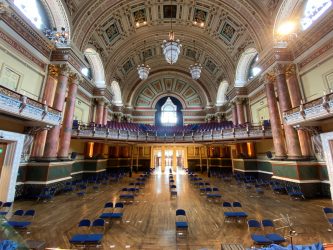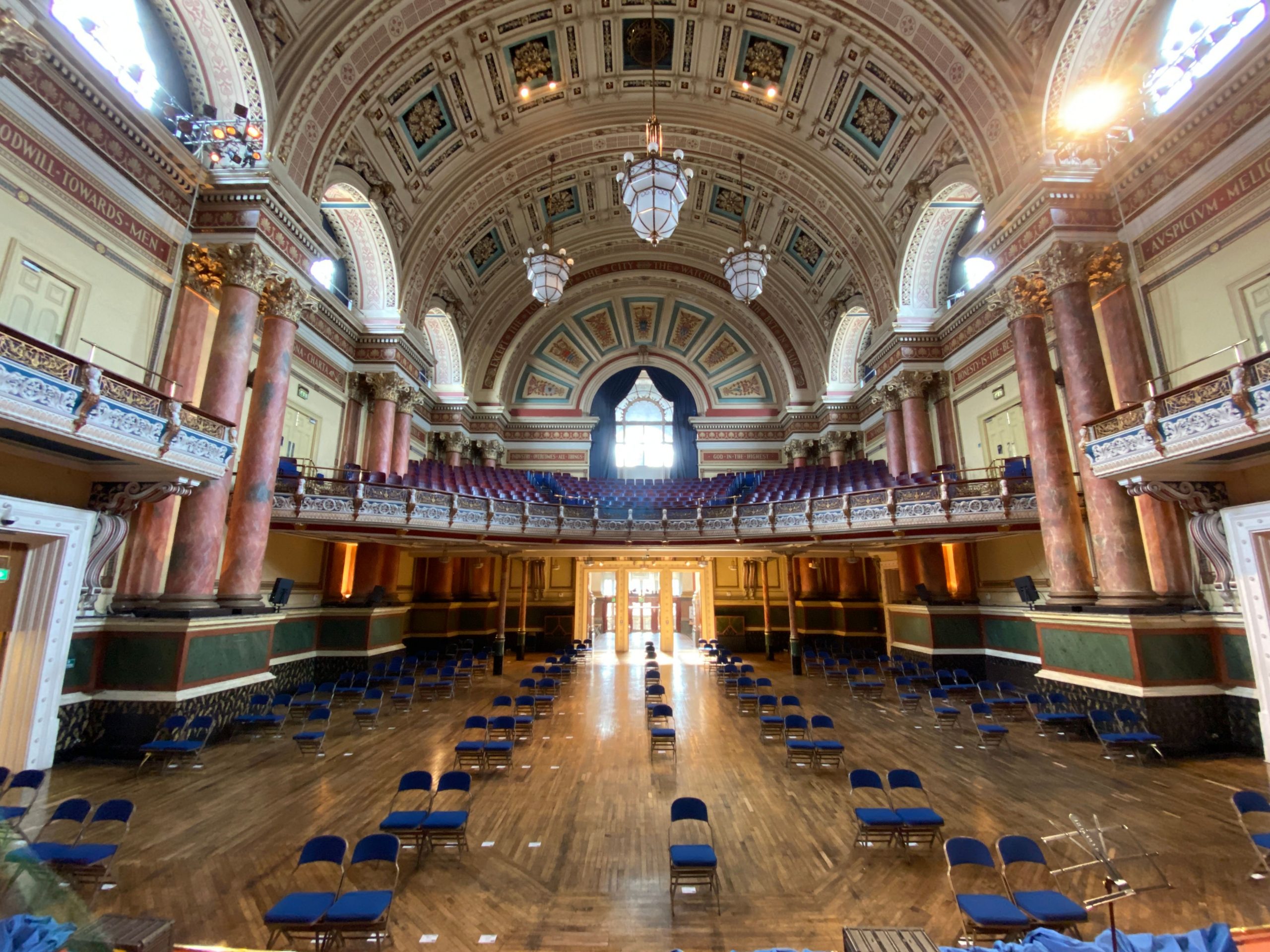 United Kingdom De Matteis, Jr, Bach, Finnis: Manchester Collective (Rakhi Singh [violin], Ruth Gibson [viola], Nicholas Trygstad [cello]), Leeds Town Hall, 11.9.2020. (CC)
United Kingdom De Matteis, Jr, Bach, Finnis: Manchester Collective (Rakhi Singh [violin], Ruth Gibson [viola], Nicholas Trygstad [cello]), Leeds Town Hall, 11.9.2020. (CC)

Nicola de Matteis, Jr – Alia Fantasia
Bach – Cello Suite No.1 in G, BWV 1007 (excerpts); Violin Sonata No.1 in G minor, BWV 1001 (Fuga – Allegro); Cello Suite No. 2 in D minor, BWV 1008 (excerpts, transc viola)
Edmund Finnis – Sister. Brother.
Bach (arr. Sitkovsetsky) – Goldberg Variations (excerpts)
… and so the World of live music slowly opens, like a butterfly emerging from a chrysalis. It certainly feels as if there’s a rebirth around the current time: events in Florence (The Three Divas, Rossini’s La Cenerentola) and London (LSO at St Luke’s, Bartók’s Bluebeard’s Castle) so far for this writer; and now the Manchester Collective returns to Leeds Town Hall. The experience remains different – the audience left the hall in controlled groups to avoid crowding at the exits, for example, and seats were socially distanced – but the feeling of renewal remains. And for the Manchester Collective, they are used to non-standard audience set-ups anyway, preferring to perform ‘in the round’ whenever possible.
Rakhi Singh, co-founder (with Adam Szabo) of the Manchester Collective, said in conversation that, when it comes to returning to the stage, ‘you go through so many feelings when you stand up and play, and to not have those adrenaline cycles means we’ve all reached a state of relaxation we don’t normally get to. It felt very special to be out there and to be sharing a live experience with everyone else. You can’t replace that, you really can’t’.
Despite my upbringing with the Hallé in the 1980s, this was my first experience of the Leeds Town Hall. It has quite a cavernous acoustic, and yet everything came across beautifully (and I was placed really quite far back). It’s no surprise to learn that Singh has played concertos there several times so has the measure of the place.
The first piece, by Nicola de Matteis Junior, was discovered by Singh during the lockdown. Reminiscent of the arpeggiated passage in the Bach Chaconne, it ‘goes places Bach wouldn’t go’; it is quite a complex piece, a study in creating a web of lines and arpeggiated spaces on one instrument. It was perfectly judged both on a performance and programming level, and led directly into Nicholas Trygstad’s superb solo Bach, Singh cross-legged on the floor, listening raptly. Three movements from the Solo Cello Suite No. 1 in G minor: the Prelude, Allemande – which here seemed to act as a prolongation of the explorations of the Prelude – and the Sarabande, the spread chords beautifully resonant in the Leeds acoustic.
Bach and Ed Finnis make superb partners. The linking of Baroque/Early Music to contemporary music is found often, perhaps because as far as Baroque is concerned, ‘it’s very dynamic music but the idea of the Romantic ego isn’t there yet, so you can inject more sides of yourself into it,’ as Singh puts it. Certainly, the Finnis seemed very linked to the Bach, and they interweaved beautifully in the case of the second and last Finnis piece, Brother. But first, Sister for violin and cello, magnificently ethereal, elusive, repeating gestures slipping and sliding against each other and demanding the utmost control from the players. Prefaced by a superb performance from Singh of the Bach Fuga from the First Violin Sonata in G minor (a piece that had been used as a test piece in the earlier rounds of the Armenian Violin Competition I reported on early in the lockdown: review) meant that each composer benefitted from the other.
One aspect of the Bach/Finnis juxtaposition that led to this programme was that both composers create space for the listener to experience what they are feeling. The longer Finnis piece Brother, for violin and viola, had two pairs of movements separated by Bach for solo viola, which really brought forward those shared emotional connections between the two composers. Violist Ruth Gibson is a terrific player, wonderfully responsive in the chamber pieces and projecting beautifully in the Bach. The first movement of the Brother has the violin and viola refracting off one another in what feels like a musical depiction of steely sunlight, while the second movement’s independent, almost canonic lines tumble around each other in the gentlest of fashions. Fascinating to hear three movements from the Bach Second Cello Suite played on the viola, the shift in instruments adding an extra layer of haunting melancholy. Gibson’s performances were masterly – I would happily listen to complete Suites from her (if you want to try the Suites for viola on disc, the Nobuko Imai performance on Philips is the one). Returning to the final two movements of the Finnis, it was perhaps inevitable that the Bach-leakage had set in, and that one heard a glacial shadow of one of the Meister’s Sarabandes in the third panel of Brother (a performance of the utmost eloquence here); the final Finnis movement, where a sort of minimalism-through-a-fairground-mirror meets keening gestures creates a cumulative momentum until its final dismissive gesture, speaks of an important individual compositional voice.
The Goldberg Variations excerpts offer their own challenges. When it comes to playing the so-called Black Pearl Variation, No.XXV, Rakhi explains that ‘you’ve normally been playing for an hour, and you get this emotionally weighty piece, so it almost feels a cheat to play that after five minutes, but we try to get ourselves into the right space for that’. The magnificent, ornate Variation XXV was almost overwhelming in its expressivity and, poignantly, its vulnerability; elsewhere, we could revel in the vivacity of Variation I, here a Baroque sprightly dance, or the speedy interchanges of Variation XXIX (fabulous bass drops from Trygstad). But for me, it was the sheer hope in the grand, dignified ascending lines of the Quodlibet of Variation XXX that seemed to sum it all up, the aspiration of a new chapter, the joy of recreation once again.
A glorious occasion, somewhat longer than the advertised hour (no bad thing), but utterly captivating. The Manchester Collective’s new EP (on the Bedroom Community label) is available via Bandcamp website here; the accompanying risograph (the EP’s ‘cover’, if you will) is also available for purchase in a limited edition print of only 75 here. And there’s more to come, including a touring exhibition that can travel to small town called Dark Days, Luminous Nights. The future just keeps on getting brighter.
Colin Clarke
For more about the Manchester Collective click here.
